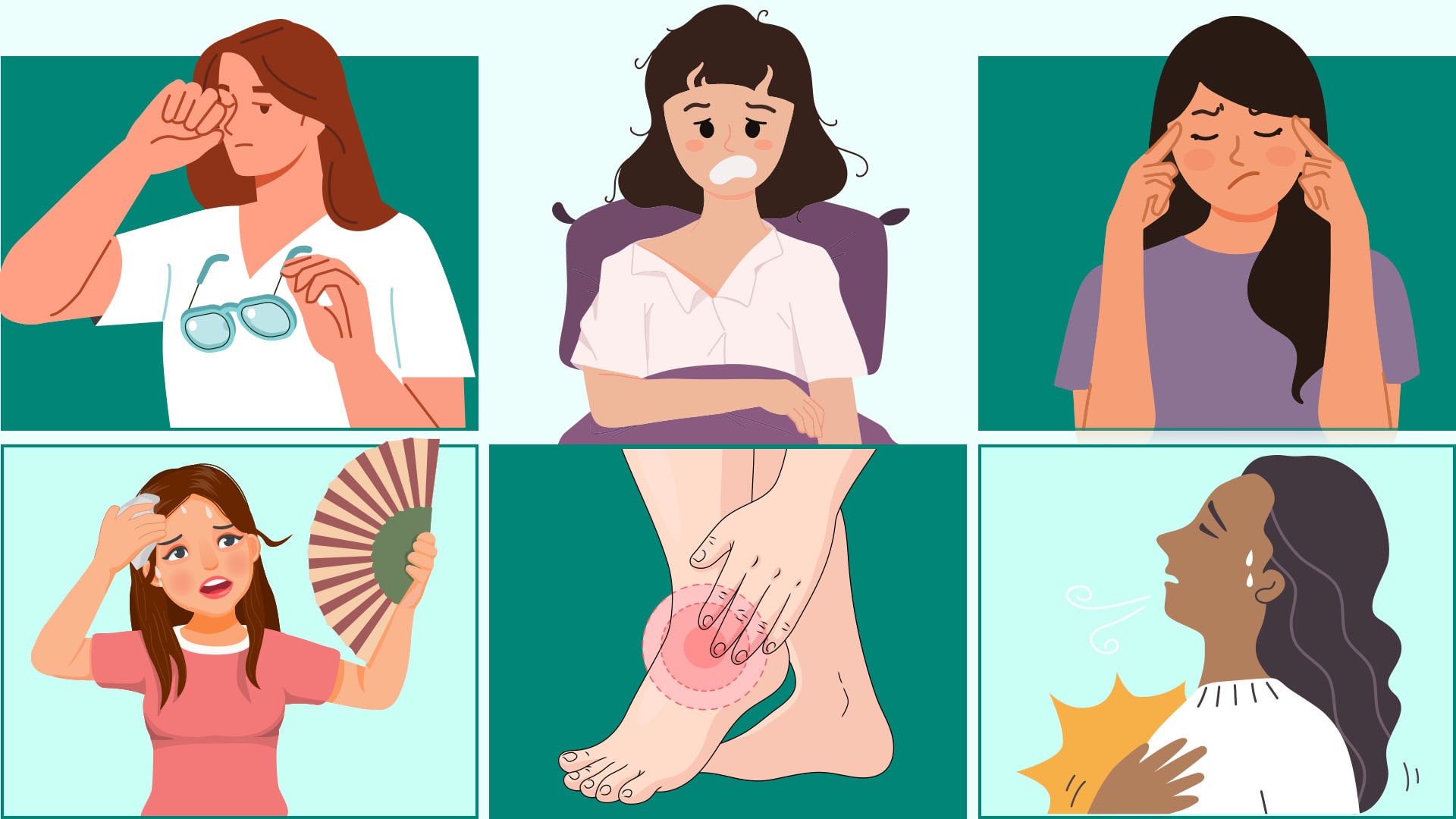AFTER a good night’s sleep, you’d expect to wake up refreshed and ready to hit the day running.
But you might be faced with a rude awakening if you’re emerging from your slumber with various aches and pains – not what you’d call a beauty sleep.
1
Often, waking up with a niggle or two is not necessarily something to worry about.
But if your mornings are not so good due to symptoms like headaches, wheezing and swollen ankles, it’s worth seeing a doctor about them, Dr Sarah Jarvis warned.
The GP and clinical consultant to Patient.info shared five red flag signs to watch out for when you wake up.
1. You’re still exhausted
If you’ve spent the night tossing and turning, it stands to reason that you won’t wake up feeling amazing.
But if you’re consistently rolling out of bed feeling like you’ve got no sleep at all, there might be something more serious at play.
“Feeling exhausted or unrefreshed when you wake could be a sign of obstructive sleep apnoea,” Dr Jarvis told Sun Health.
Sleep apnoea is when your breathing stops and starts while you sleep.
It can be pretty hard to tell if this is happening to you, unless someone is snoozing next to you.
If your bedfellow complains that you’re making gasping, snorting and choking noises, snoring loudly or waking up a lot, it’s important you see a GP.
Without treatment, sleep apnoea can heighten your risk of other problems like high blood pressure, stroke, type 2 diabetes and depression.
Not to mention, it’ll leave you feeling very tired throughout the day as you grapple with mood swings, concentration issues and clanging headaches as soon as you crack open your eyes.
Dr Jarvis added: “Extreme tiredness for no reason can also be a sign of cancer, although this is less closely linked to the time when you wake.”
According to Cancer Research UK, some 65 per cent of cancer patients are affected by fatigue.
2. You have a headache
Starting the day off with a searing headache can be especially miserable.
Sometimes your throbbing temples will simply be caused by having a few too many glasses of wine the night before.
And – as mentioned above – waking up with a headache can also be a sign of sleep apnoea.
But headaches that wake you from sleep can be a sign of something as serious as cancer.
“Although uncommon, it’s extremely important to get these checked out as they could be a sign of a brain tumour,” Dr Jarvis stressed.
The most common symptoms of a brain tumour

More than 12,000 Brits are diagnosed with a primary brain tumour every year — of which around half are cancerous — with 5,300 losing their lives.
The disease is the most deadly cancer in children and adults aged under 40, according to the Brain Tumour Charity.
Brain tumours reduce life expectancies by an average of 27 years, with just 12 per cent of adults surviving five years after diagnosis.
There are two main types, with non-cancerous benign tumours growing more slowly and being less likely to return after treatment.
Cancerous malignant brain tumours can either start in the brain or spread there from elsewhere in the body and are more likely to return.
Brain tumours can cause headaches, seizures, nausea, vomiting and memory problems, according to the NHS.
They can also lead to changes in personality weakness or paralysis on one side of the problem and problems with speech or vision.
The nine most common symptoms are:
- Headaches
- Seizures
- Feeling sick
- Being sick
- Memory problems
- Change in personality
- Weakness or paralysis on one side of the body
- Vision problems
- Speech problems
If you are suffering any of these symptoms, particularly a headache that feels different from the ones you normally get, you should visit your GP.
Source: NHS
3. You’re drenched in sweat
Waking up drenched in sweat can be an everyday reality of those going through the menopause.
It’s up there with other well-known symptoms like hot flushes and brain fog.
But ‘coming to’ with your pyjamas and sheets stuck to your skin can in some cases be a sign of cancer, Dr Jarvis added.
She told Sun Health: “While this is a common symptom of menopause, it can also be a sign of cancer such as lymphoma.”
Lymphoma is a type of blood cancer that affects the immune system.
Over 14,000 people are diagnosed with lymphoma each year in the UK, according to Blood Cancer UK.
A common symptom of the cancer is painless lumps in your neck, collarbone, armpit, or groin, as well as other parts of the body.
Aside from night sweats that soak your bedding, lymphoma can cause unexplained weight loss and a fever.
4. You’re wheezing
If you have asthma – a common lung condition causing breathing difficulties – wheezing won’t be a foreign concept to you.
But waking early in the morning with wheezing or shortness of breath if you have asthma could be something to worry about.
“This is often a red flag that your asthma is worsening,” Dr Jarvis said.
Your condition may be getting worse if you haven’t kept up with using your preventer inhaler or you’re dealing with stress or hormonal changes, according to Asthma + Lung UK.
Other symptoms that your asthma isn’t as well managed as it should be include:
- Feeling breathless
- Coughing
- Having a tight chest
- Symptoms waking you up at night
- Finding it harder to do everyday things like housework, playing with children, or going to work
- Having to use your reliever inhaler more than usual
5. Ankles are swollen
Swollen ankles after a long flight tends to be nothing to worry about.
But puffiness around your feet is certainly not a sight you want to behold when you wake up.
According to Dr Jarvis: “Swollen ankles when you wake in the morning can be a sign of kidney problems or heart failure.”
Swelling in the ankles, feet and legs is often caused by a build-up of fluid in these areas, called oedema.
Kidney disease – a long term condition where the organs don’t work as well they should – doesn’t tend to cause symptoms in the early stages.
But you may develop a number of symptoms if it isn’t spotted early or the disease gets worse.
Aside from swollen ankles, feet and hands, these can include unintentional weight loss and poor appetite, tiredness, shortness of breath, blood in your pee and an increased urge to go to the loo.
Heart failure occurs when the heart struggles to pump blood around the body properly.
Breathlessness, extreme tiredness and feeling lightheaded or fainting are among the main symptoms, on top of swelling.
When your partner’s snoring is a concern
Lots of people snore… So when is it really a concern?
Dr Verena Senn, sleep expert at Emma Sleep, told The Sun when snoring could indicate sleep apnoea – a sleep condition that causes breathing to repeatedly stop and re-start when you’re asleep.
The main symptoms are feeling very tired, finding it hard to concentrate and having mood swings, the NHS says.
Dr Senn said that sleep apnoea can often go undetected as it can happen without the patient’s knowing.
“Sleep partners can therefore play a crucial role in recognising this serious disease so it can be treated.”
You should tell your partner to visit their GP if:
- Their snoring is really loud
- They stop breathing while sleeping
- They wake up gasping or choking through the night
- They complain of sleepiness in the daytime or headaches in the morning
People with obstructive sleep apnoea will often also suffer with high blood pressure.
When you stop breathing during your sleep, your nervous system kicks in and releases stress hormones which may raise blood pressure over time.




